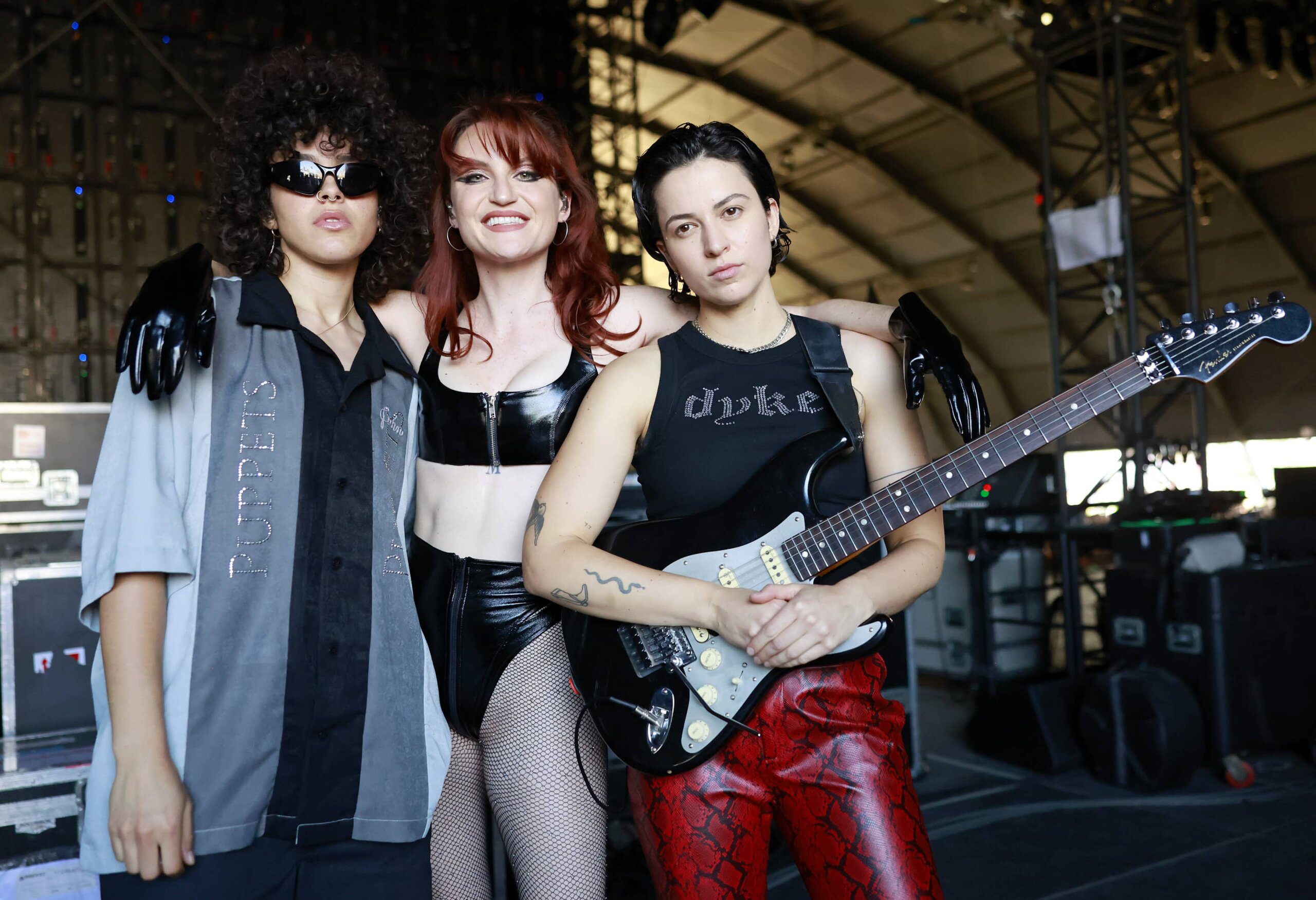Back when I was a teenager, there weren’t many queer pop stars. We had Tracy Chapman, Tegan and Sara and other queer women musicians who played in other genres. But pop music was straight—like, painfully so. I didn’t technically become a teenager until 2005, but even before then I was cognizant of the landscape of pop music. We had songs like “All the Things She Said” by t.A.T.u. and “I Kissed a Girl” by Katy Perry. It was a desert back then. And the general public was deeply homophobic.
In the early to mid 2000s, that homophobia was usually your parents telling you that your queerness was just a phase, or friends distancing themselves from you once you came out. So, being queer at that time was rough. That’s why I think it’s so cool that there has been an emergence of queer pop stars over the last 10 years or so. As a girl who hurriedly told my elementary school friends that I had a crush on Lance Bass to cover for my real crush—my female teacher—bands like MUNA are a breath of fresh air.
Composed of Josette (Jo) Maskin, Katie Gavin and Naomi McPherson, MUNA began working together in 2013, with their debut EP More Perfect being released the following year. The trio met while studying at the University of Southern California, and began making music together shortly after. MUNA wasn’t on my radar until 2019, when they released their second album, Saves the World. I had only heard one song from the album around the time it came out, “Pink Light,” and kind of forgot about the band after, even though I found the song super catchy.
MUNA re-entered my line of sight when they released the single “Silk Chiffon” off their 2022 self-titled album. After being dropped by their previous label, they signed to Phoebe Bridgers’s Saddest Factory. Bridgers is featured on “Silk Chiffon,” and I think that probably introduced a lot of new fans to the band.
“When I saw Maskin wearing the black ‘Dyke’ tank top that is now official tour merch, I knew I had found the band I wanted to exist all through being a baby dyke in high school.”
Just because I didn’t become a fan of MUNA early on in their career doesn’t mean that they weren’t making fucking bangers. “Loudspeaker” from their 2017 debut album, About U, is a sexy synthpop song that still slaps. The track that follows, “I Know A Place,” was featured in The Carmilla Movie and Alex Strangelove on Netflix. It’s the perfect kind of track you want to hear while dancing with someone cute at your local gay bar.
What I love so much about MUNA is their unabashed queerness. They recently performed “Silk Chiffon” on Good Morning America, and it’s absolutely bonkers to think about queer people singing about loving each other on mainstream morning television. When I saw Maskin wearing the black “Dyke” tank top that is now official tour merch, I knew I had found the band I wanted to exist all through being a baby dyke in high school.
I can’t overstate how crucial it would have been for me to have a band like MUNA back then, hell, even in college. I graduated from college in 2014, and had my second big queer heartbreak the previous year. If I had heard a song like “Winterbreak” back then, it would have ruined me in the best way possible. In those days, it was isolating being not only queer, but Black and queer. I tried to read as many lesbian poets as I could, tried to listen to whatever queer musicians were out and proud at the time.
At the time, I tried looking for queer family wherever I could. Sometimes, that led me into the arms of women who were not good for me. After those flings, I would turn to music to get me through—music that was often by women, written about men. Growing up, I listened to a lot of R&B and soul from the ’70s and ’80s, so I turned to artists like Patti LaBelle and Marvin Gaye. I read poets like Yona Harvey, Lucille Clifton and Audre Lorde. In some respects, poems or songs about heartbreak can be universal, regardless of gender or sexuality. Sometimes a straight cis dude writes something poignant on the topic and I’m shocked.
But there is something super special about listening to a queer person write about the experience of loving and having your heart broken by another queer person. Or, even singing about love that is fruitful and “successful,” if that is ever even an appropriate way to describe love. I used to say a lot that dykes just love harder, love deeper and get what it means to love more than straight people do. Even when I was getting treated poorly in my relationships, I believed this. What draws me to MUNA so much is that they make music that is itself a love letter to queer romance and heartbreak.
That deep sense of wanting to belong, wanting to find love, drives us together. MUNA so expertly captures this feeling of longing and desire. I think about the song “Who” off of Saves the World, a breakup song that focuses on the longing and heart-wrenching reality of leaving a relationship when you aren’t necessarily over someone.
It seems like MUNA has a song for every season of my ever-shifting relationship to love and desire. Whether it’s “Pink Light” or “Silk Chiffon,” they always have a way of capturing what I am feeling, what I would say if I was a musician. But for now, I’ll stick to writing sad poems about my mommy issues and let MUNA handle the music side of things. They are far better at it than me.


 Why you can trust Xtra
Why you can trust Xtra


